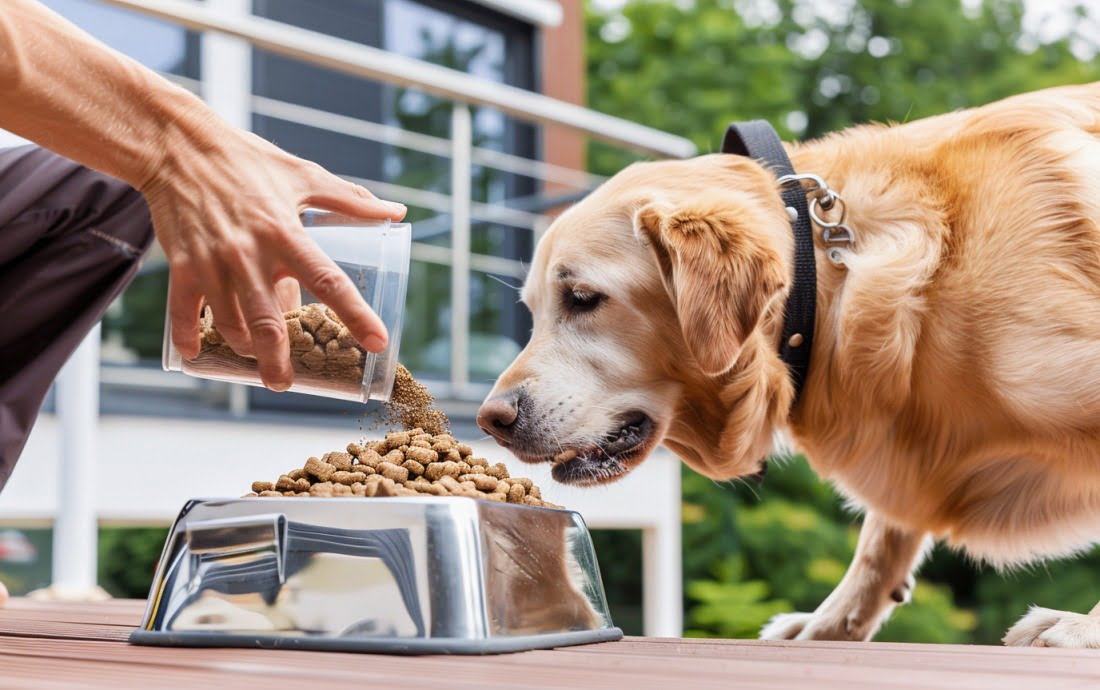Does your furry companion turn their nose up at dinner or suffer from frequent bouts of diarrhea or vomiting? If so, they might be among the many dogs dealing with a sensitive stomach. Just like humans, dogs can experience tummy troubles that make mealtimes a challenge. In this comprehensive guide, we’ll delve into the world of canned and wet dog foods specifically designed for these sensitive souls. We’ll explore what causes digestive upset in dogs, how to choose the perfect food to soothe their tummies, and offer practical tips to make mealtimes enjoyable again.
By the time you finish reading this guide, you’ll be equipped with the knowledge to transform your dog’s dining experience from a dreaded event into a happy, tail-wagging occasion. Let’s embark on this journey to uncover the best canned and wet dog foods that will bring comfort and relief to your four-legged friend.

Understanding Sensitive Stomachs in Dogs
What Causes Sensitive Stomachs in Dogs?
A sensitive stomach in dogs isn’t a single condition but rather a cluster of symptoms stemming from various underlying causes. It’s akin to a puzzle, where each piece contributes to the overall picture of your dog’s digestive discomfort. Let’s piece together this puzzle by exploring the most common culprits:
Food Allergies and Intolerances: The Unseen Culprits
Just like us, dogs can develop allergies or intolerances to certain ingredients in their food. These adverse reactions are often triggered by proteins like chicken, beef, or dairy. In the case of allergies, the immune system mistakenly identifies the protein as a threat, leading to a cascade of inflammatory responses. Intolerances, on the other hand, involve the digestive system’s inability to properly break down a specific ingredient, resulting in gastrointestinal distress.
Digestive Disorders: Disruptions in the Gut
Sensitive stomachs can also be a symptom of underlying digestive disorders. Conditions like inflammatory bowel disease (IBD) or pancreatitis can wreak havoc on the delicate balance of the gut, leading to chronic inflammation and malabsorption of nutrients. These disorders often necessitate specialized diets and veterinary care to manage effectively.
Other Factors: Stress, Infections, and More
Stress, bacterial or viral infections, parasites, and sudden changes in diet can also contribute to a sensitive stomach in dogs. It’s crucial to consider these factors when trying to pinpoint the root cause of your furry friend’s tummy troubles.
Recognizing the Signs: When to Seek Help
A dog with a sensitive stomach may exhibit a variety of symptoms, including vomiting, diarrhea, gas, loss of appetite, and lethargy. If your dog experiences any of these signs, it’s essential to consult with your veterinarian to determine the underlying cause and develop an appropriate treatment plan. Remember, early intervention is key to managing a sensitive stomach and ensuring your dog’s overall well-being.

Choosing the Right Food for Dogs with Sensitive Stomachs
Your Veterinarian: Your Partner in Digestive Health
Embarking on the journey of finding the perfect food for your sensitive-stomached companion begins with a visit to your trusted veterinarian. They are the experts in diagnosing the root cause of your dog’s digestive woes and tailoring a diet plan that caters to their specific needs.
Limited-Ingredient Diets: Simplifying the Recipe
One popular approach is opting for limited-ingredient diets. These formulas contain a restricted number of ingredients, minimizing the chances of triggering allergies or intolerances. Look for options that feature a single source of protein, like lamb or fish, along with easily digestible carbohydrates like sweet potato or brown rice.
Hydrolyzed Protein Diets: Breaking Down the Barriers
For dogs with severe allergies, hydrolyzed protein diets may be the answer. These diets contain proteins that have been broken down into smaller particles, making them less likely to provoke an immune response. While not as palatable as some other options, they offer a lifeline for dogs with extreme sensitivities.
Prescription Diets: Tailored Nutrition
In some cases, your veterinarian may recommend a prescription diet specifically formulated for digestive health. These diets often contain additional ingredients like prebiotics and probiotics to support gut health, as well as easily digestible proteins and carbohydrates.
Key Considerations: Beyond the Label
Choosing the right food involves more than just scanning the label. Consider your dog’s age, breed, activity level, and any underlying health conditions. Some dogs may require grain-free options, while others may benefit from added fiber for better digestion.
Transitioning with Care: A Gradual Approach
When switching to a new food, gradual transitions are crucial. Start by mixing a small amount of the new food with your dog’s current food, gradually increasing the proportion over several days. This allows their digestive system to adjust and minimizes the risk of further upset.
By working closely with your veterinarian and considering these factors, you can find the perfect food to nourish your dog’s sensitive stomach and restore their digestive harmony.

Feeding Tips for Dogs with Sensitive Stomachs
Transitioning to a New Food: Slow and Steady Wins the Race
Switching your dog’s food abruptly can shock their delicate digestive system. To ensure a smooth transition, gradually introduce the new food over several days. Start by mixing a small portion with their current food and gradually increase the ratio until they are solely on the new diet. Patience is key here, as a rushed transition can exacerbate existing sensitivities.
Small, Frequent Meals: A Gentle Approach
For dogs with sensitive stomachs, smaller, more frequent meals are often easier to digest than large, infrequent ones. Instead of two large meals, consider dividing their daily portion into three or four smaller ones. This approach can help prevent overloading their digestive system and reduce the likelihood of vomiting or diarrhea.
Monitor for Changes: Be Observant
After transitioning to a new food, keep a close eye on your dog’s stool consistency, energy levels, and overall demeanor. If you notice any signs of digestive upset, such as vomiting, diarrhea, or loss of appetite, consult your veterinarian. They can help you determine if the new food is agreeing with your dog or if further adjustments are needed.
Hydrate, Hydrate, Hydrate!
Water is essential for a healthy digestive system. Ensure your dog has access to fresh, clean water at all times, especially when transitioning to a new food or experiencing tummy troubles.
By following these feeding tips, you can create a positive dining experience for your dog and support their digestive health. Remember, patience and consistency are key to helping your furry friend thrive.
Additional Resources for Dog Owners
Delving Deeper into Canine Digestive Health
The journey towards optimal digestive health for your furry friend doesn’t end here. To empower you with further knowledge and support, we’ve compiled a list of valuable resources:
- American Kennel Club (AKC): The AKC offers a wealth of information on dog nutrition, including articles on sensitive stomachs and food recommendations.
- Dog Food Advisor: This website provides in-depth reviews and ratings of various dog food brands, making it easier for you to choose the right option for your sensitive-stomached companion.
- Veterinary Websites and Organizations: Reputable veterinary websites like the American Veterinary Medical Association (AVMA) and the World Small
Animal Veterinary Association (WSAVA) offer reliable information on canine digestive health.
Your Veterinarian: Your Trusted Partner
Remember, your veterinarian is your most valuable resource. Don’t hesitate to reach out to them with any questions or concerns about your dog’s sensitive stomach. They can provide personalized guidance and recommend the best course of action for your furry friend.
While this article focuses on the best wet dog food for sensitive stomachs, it’s worth noting that proper nutrition is equally crucial for puppies. If you’re searching for top-rated puppy food options, check out our comprehensive guide on the Best Puppy Food in 2024.
Conclusion
Choosing the right canned and wet dog food for your sensitive-stomached companion is a journey of love, patience, and understanding. By unraveling the mysteries behind digestive sensitivities, collaborating with your veterinarian, and exploring the diverse world of specially formulated diets, you can provide your furry friend with the nourishment they need to thrive.
Remember, a happy tummy translates to a happy dog. Armed with the knowledge from this guide, you’re well-equipped to make informed decisions that will transform mealtimes into joyful experiences for both you and your beloved pet. Embrace the opportunity to nurture their well-being through carefully chosen food, and watch as their tail wags with renewed enthusiasm and their playful spirit returns.
FAQs
What are the telltale signs that my dog’s sensitive stomach is linked to their food?
Frequent vomiting or diarrhea, excessive gas, bloating, decreased appetite, and changes in stool consistency can all point to a food-related sensitivity.
My dog has a sensitive stomach, but also has allergies. Can I find a canned food that addresses both issues?
Yes, many limited-ingredient and hydrolyzed protein diets cater to both sensitivities and allergies. Look for options with novel protein sources like venison or duck, and limited carbohydrate sources. Your veterinarian can guide you towards the best choice for your dog’s specific needs.
Are grain-free canned foods always the best choice for dogs with sensitive stomachs?
Not necessarily. While some dogs thrive on grain-free diets, others may do just fine with easily digestible grains like brown rice or oatmeal. Focus on the overall quality of ingredients and consult your vet for the best approach for your dog.
Can switching to a wet food diet help improve my dog’s sensitive stomach?
Yes, the higher moisture content in wet food can be gentler on the digestive system and easier to digest for some dogs. However, it’s important to choose a high-quality wet food with limited ingredients and no artificial additives.
How long does it typically take to see improvements in my dog’s sensitive stomach after switching to a new food?
It varies, but you may notice positive changes within a few days to a few weeks. It’s crucial to transition gradually to the new food and monitor your dog’s response closely.

Healthy dogs mean happy dogs, and that makes me happy! I’m here to share all the tips for keeping your best furry friend in top shape, from puppyhood to their golden years.

